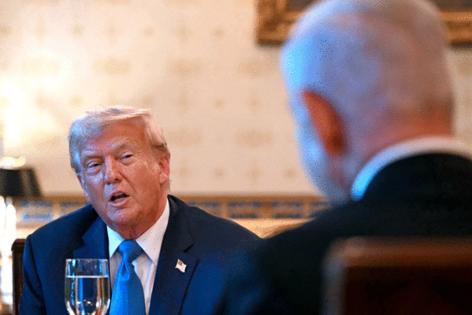Trump says he will not allow Israel to annex the West Bank
Published in News & Features
U.S. President Donald Trump said he would not allow Israel to annex the West Bank, as Israeli Prime Minister Benjamin Netanyahu faces pressure from some members of his coalition to increase Israeli control over the region.
“I will not allow Israel to annex the West Bank, I will not allow it,” Trump told reporters in the Oval Office on Thursday. Asked if he had discussed that stance with Netanyahu, Trump demurred, suggesting that it did not matter “whether I spoke to him or not.”
“I’m not allowing Israel to annex the West Bank. There’s been enough. It’s time to stop now,” he added.
Trump on Friday said “it’s looking like we have a deal on Gaza” that will “get the hostages back” and “end the war,” without offering further details or saying whether Israel or Hamas agree.
Any moves to formally annex parts or all of the West Bank — the larger of two Palestinian territories neighboring Israel — would threaten to further inflame the region. Arab allies of the U.S., including the United Arab Emirates, have said such a move would be a “red line,” potentially jeopardizing U.S.-brokered normalization efforts between the Gulf and Israel.
Since the Hamas attack on Oct. 7, 2023, Israel has ramped up the establishment of settlements in the West Bank, considered a violation of international law by the majority of world governments. Last month, Israel approved a controversial project to build thousands of homes on a wedge of land east of Jerusalem that had long been seen as off-limits because it effectively bisects the West Bank — a move Netanyahu’s finance minister Bezalel Smotrich said “buries the idea of a Palestinian state.”
Trump’s comments follow a meeting earlier this week with leaders of Muslim-majority countries aimed at moving toward a negotiated settlement to the war between Israel and Hamas, but that goal has proved elusive. Meanwhile, the U.S. is facing increasing pressure from allies to help curb Netanyahu’s military operations in the region, particularly following Israel’s unprecedented airstrike on Qatar this month.
U.S. envoy to the Middle East Steve Witkoff said he was hopeful for progress in the war in Gaza after Trump presented regional leaders with a plan he said would address concerns their concerns as well as Israel’s. He didn’t provide details on what the plan entails.
Former U.K. Prime Minister Tony Blair is reportedly seeking a senior role in the administration of postwar Gaza under Trump’s administration, the Financial Times said citing people familiar with the proposal.
“This is an olive branch to Arab states and a sign that pressure to end the war is starting to have an impact,” said Bloomberg Economics’ lead for Middle East geoeconomics Dina Esfandiary. “But de facto annexation has been occurring and is likely to continue, no matter what Trump says.”
Trump has continued to back Netanyahu throughout almost two years of war in Gaza, even as the outcry for Israel’s conduct in the war and the ensuing humanitarian crisis in the enclave escalated. That’s led to a cascade of governments, including the U.K., Canada, France and Australia, recognizing a Palestinian state for the first time this week, adding to more than 150 nations that already did so.
Two major U.S. allies, France and Saudi Arabia, co-hosted a conference Monday advocating for Palestinian statehood and an end to the war in Gaza. The drive has drawn criticism from both Trump and Israel, who say it amounts to a win for Hamas, which is designated a terrorist group by the U.S. and the European Union.
---------
—With assistance from Neil Munshi and Derek Wallbank.
___
©2025 Bloomberg L.P. Visit bloomberg.com. Distributed by Tribune Content Agency, LLC.







Comments